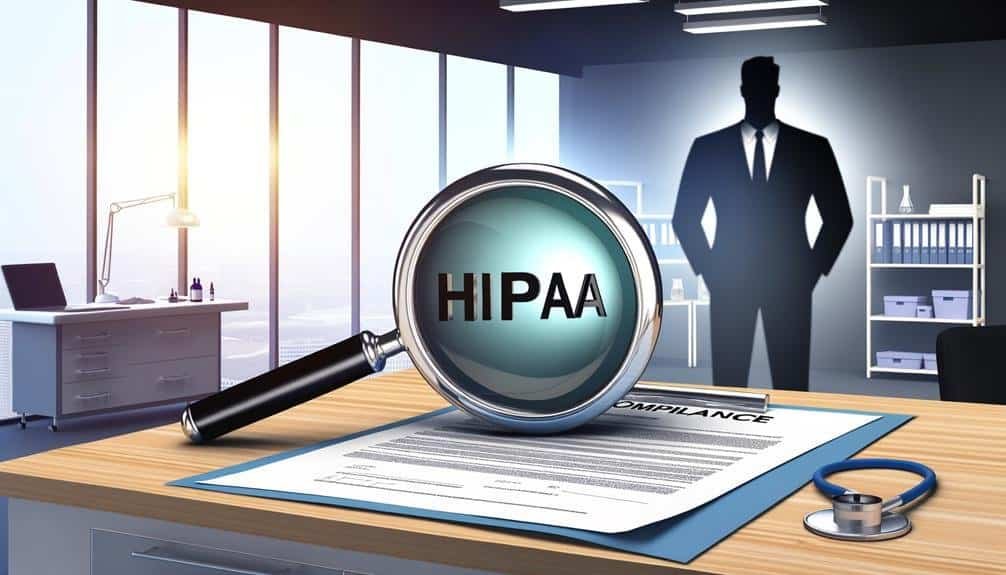Which Agency Is Responsible for Enforcing HIPAA Compliance?
Did you know that in 2020, the number of reported healthcare data breaches reached a staggering 599?
With the increasing concern over the security and privacy of personal health information, it becomes crucial to understand who is responsible for enforcing HIPAA compliance.
So, who exactly is tasked with ensuring that healthcare providers and organizations adhere to the regulations set forth by the Health Insurance Portability and Accountability Act?
In this discussion, we will explore the various agencies involved in enforcing HIPAA compliance and shed light on their roles and responsibilities.
Rest assured, by the end, you'll have a clearer understanding of the key players in safeguarding your healthcare data.
Key Takeaways
- The Department of Health and Human Services (HHS) and the Office for Civil Rights (OCR) are responsible for enforcing HIPAA regulations, conducting investigations and audits, and imposing penalties for non-compliance.
- The Centers for Medicare and Medicaid Services (CMS) oversees the administration of healthcare programs and enforces certain provisions of the HIPAA Privacy Rule and Security Rule, ensuring compliance of Medicare and Medicaid providers.
- The Office of the National Coordinator for Health Information Technology (ONC) promotes the adoption and use of health IT, focusing on interoperability of healthcare systems and facilitating secure sharing of patient information.
- State Attorneys General have authority at the state level to enforce HIPAA compliance, impose fines, and file lawsuits seeking injunctive relief and damages, playing a vital role in protecting patient privacy and security.
The Department of Health and Human Services (HHS)
How does the Department of Health and Human Services (HHS) enforce HIPAA compliance?
The HHS is responsible for enforcing HIPAA regulations through its Office for Civil Rights (OCR). The OCR conducts investigations and audits to ensure covered entities and business associates comply with HIPAA rules. They receive and investigate complaints related to HIPAA violations and can impose penalties for non-compliance.
The HHS also provides guidance and education to help entities understand and meet their HIPAA obligations. In cases of serious breaches or willful neglect, the HHS may pursue legal action and impose substantial fines.
The HHS enforcement efforts aim to protect the privacy and security of individuals' health information and maintain the integrity of the healthcare system.
Office for Civil Rights (OCR)
To further ensure HIPAA compliance, the Office for Civil Rights (OCR) plays a crucial role in investigating potential violations and imposing penalties for non-compliance. The OCR is responsible for enforcing the privacy and security rules under HIPAA. They work closely with healthcare providers to ensure that patient information is protected and that proper safeguards are in place. The OCR conducts audits and investigations to assess compliance with HIPAA regulations, and they have the authority to impose fines and penalties for violations. They also provide guidance and resources to help healthcare providers understand and meet their obligations under HIPAA. By collaborating with healthcare providers, the OCR aims to create a culture of compliance and protect the privacy and security of patient information.
| OCR's Role in HIPAA Enforcement | OCR's Collaboration with Healthcare Providers |
|---|---|
| Investigating potential violations | Providing guidance and resources |
| Imposing penalties for non-compliance | Conducting audits and investigations |
| Enforcing privacy and security rules | Creating a culture of compliance |
| Protecting patient information | Assessing compliance with HIPAA regulations |
Centers for Medicare and Medicaid Services (CMS)
The Centers for Medicare and Medicaid Services (CMS) oversee the administration of healthcare programs for eligible individuals in the United States. While CMS primarily focuses on healthcare program administration, it also plays a role in enforcing HIPAA compliance.
CMS has the authority to enforce certain provisions of the HIPAA Privacy Rule and the HIPAA Security Rule. Specifically, CMS is responsible for ensuring that healthcare providers who participate in Medicare and Medicaid comply with HIPAA regulations. This includes conducting audits, investigations, and imposing penalties for non-compliance.
CMS works closely with the Office for Civil Rights (OCR) to ensure that covered entities are meeting their obligations under HIPAA. By collaborating with OCR, CMS strengthens its authority in enforcing HIPAA compliance and upholding patient privacy and security.
Office of the National Coordinator for Health Information Technology (ONC)
The Office of the National Coordinator for Health Information Technology (ONC) plays a crucial role in promoting the adoption and use of health IT in the United States.
One of the key areas where the ONC focuses its efforts is promoting interoperability, which is the ability of different healthcare systems and technologies to exchange and use health information seamlessly.
The ONC develops and implements regulations and standards that aim to facilitate interoperability, ensuring that healthcare providers can securely share patient information and coordinate care more effectively.
These regulations have had a significant impact on healthcare providers, as they're required to comply with the ONC's standards and requirements for health IT systems.
State Attorneys General
State Attorneys General play a vital role in enforcing HIPAA compliance and ensuring the privacy and security of patients' health information. These legal professionals serve as key enforcers at the state level, with the power to investigate and take action against entities that violate HIPAA regulations.
Here are two enforcement mechanisms that State Attorneys General can employ to protect patients:
- Civil Monetary Penalties: State Attorneys General have the authority to impose fines on covered entities found to be non-compliant with HIPAA. These penalties serve as a deterrent and encourage organizations to prioritize patient privacy and security.
- Legal Actions and Lawsuits: State Attorneys General can file lawsuits against entities that violate HIPAA, seeking injunctive relief and damages on behalf of affected patients. This legal action holds violators accountable and reinforces the importance of safeguarding health information.
Conclusion
You should definitely be relieved that the Department of Health and Human Services (HHS) is the agency responsible for enforcing HIPAA compliance.
Their Office for Civil Rights (OCR) ensures that your health information is kept secure and private.
They work alongside the Centers for Medicare and Medicaid Services (CMS) and the Office of the National Coordinator for Health Information Technology (ONC) to ensure that healthcare providers and organizations follow HIPAA regulations.
It's like having a team of superheroes protecting your sensitive medical data!







